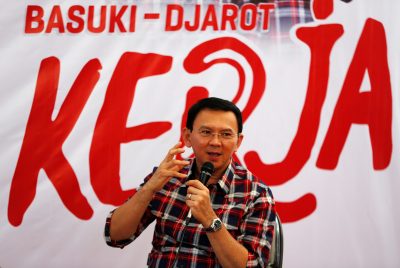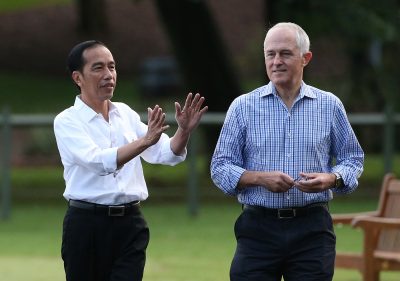By Max Walden
“DESTINY
is in God’s hands,” said Jakarta governor Basuki “Ahok” Tjahaja Purnama on
election night as he conceded the Jakarta gubernatorial election. “God gives
power and God also takes it away.”
Even
until the bitter end, religion defined the race for the next leader of
Indonesia’s capital.
Ever
since September last year when Christian Ahok made comments regarding the Quran
whilst campaigning in Jakarta’s Thousand Islands, hardline Islamic groups
spearheaded a mass movement to topple the incumbent.
The leader
of the hardline Islamic Defenders Front (FPI) Habib Rizieq talks to reporters
at court after the blasphemy trial of Jakarta’s incumbent governor Basuki
Tjahaja Purnama, also known as Ahok in Jakarta, Indonesia, February 28, 2017.
Source: Reuters/Beawiharta Indonesia’s
vice president Jusuf Kalla said Friday he was disappointed with the foreign
media’s depiction of the Jakarta election as a win for conservative Islam and
religious intolerance.
Jusuf
wasn’t wrong to say so. Headlines everywhere after Wednesday’s divisive contest
said votes were driven by religious sentiment and the entire showdown was a
referendum on the future of ethno-religious diversity in the world’s most
populous Muslim country.
But it’s
also impossible to deny the whipping up of religious fervour by hardline groups
was a vital factor Ahok’s unceremonious fall from power.
A
post-election survey by Saiful Mujani Research & Consulting, a credible
pollster, showed that 32.4 percent of Anies voters had chosen the candidate because they were
the same religion as him.
Literally
zero percent of Ahok voters said the same (notwithstanding that many of Ahok’s
voters are, of course, Muslim.)
Despite
the catapulting of religious issues to the centre of the Jakartan election,
however, it was not only sectarian concerns that brought down the second-ever
non-Muslim, Chinese governor in the city’s history.
Because
here’s another vital factor: Ahok was not loved by everybody.
His detractors
and opponents were from a broad spectrum of Jakarta’s diverse population, not
only ultra-conservative Muslims who hated him based on identity politics.
Human
rights activists opposed the governor for his unapologetic regime of
large-scale evictions of slum dwellers to make way for development.
Ahok
continues to unapologetically defend this policy, even though swathes
of the poor who supported him in 2012 became Anies devotees after
being forcibly relocated from the neighbourhoods they had lived in for generations,
stripping them of their livelihoods.
They felt
angry and betrayed.
Even
after losing the election on Friday, Ahok declared at city hall that “normalisation” of the Ciliwang River would continue.
Further
communities would be relocated upon completion of rusun public housing
flats currently under construction that can accommodate 2,000 residents, he
said.
Besides
that, many simply disliked Ahok because they perceived him as arrogant and rude
– undesirable qualities in a country like Indonesia where politeness and
etiquette are paramount.
Some
among the Chinese-Indonesian minority group worried that Ahok’s brash style and controversial comments regarding the Quran had
fanned further xenophobic sentiment against their community.
A lot of
people no doubt chose their candidate based on policy, not identity. One image
shared during the campaign read, “We are of Chinese descent, we are non-Muslim,
we choose Anies-Sandi because the business climate will be more conducive if
Anies-Sandi win.”
“We are
of Chinese descent, we are non-Muslim, we choose Anies-Sandi because the
business climate will be more conducive if Anies-Sandi win.” Source: Twitter
It is
also worth remembering that Ahok was never in the first place chosen as
governor, rather coming to power after Joko “Jokowi” Widodo was elected
president in 2014.
From
square one, he ultimately lacked a popular mandate for his robust policy agenda
of reforming the civil service and cleaning up corruption, addressing Jakarta’s
systemic problems with traffic and flooding.
For too
long during the campaign, Ahok’s team misjudged the power of his record in
office to win votes.
Their
strategy was to emphasis the governor’s achievements in reducing floods,
building public transport links and improving quality of life.
But given
that three quarters of Jakarta’s population approved of Ahok’s leadership in
office, however that he couldn’t win 50 percent of the popular vote, signals
the potency of other concerns.
It was
only late in the campaign that Ahok and running mate Djarot Saiful Hidayat’s
team released material aimed at pulling Jakarta residents’ heartstrings –
unleashing a series of videos that appealed to Indonesia’s nationalism and core
values of Bhinneka Tunggal Ika – unity in diversity.
Assuming
it was merely religious intolerance and racism that led to Ahok’s loss denies
the strengths of Anies Baswedan and Sandiaga Uno’s campaign.
As a
former academic and one of Indonesia’s most successful businessmen,
respectively, Anies and Sandiaga are widely respected, and regarded by many as
charming, intelligent and articulate personalities.
Their
political style no doubt particularly appealed to upper middle class Muslims in
their wealthy, Muslim-majority heartland in South Jakarta.
But
the extent of their popularity is highlighted by the fact that
on Wednesday, they even won the most votes in North Jakarta, known for its
significant ethnic Chinese population.
What’s
more, the pair’s “Oke Oce” campaign was also clever and catchy, appealing to a
broad range of voters from millennials to baby boomers alike.
So while
it’s true the coordinated campaign against Ahok that successfully
mainstreamed sectarian discourse played its part in his defeat,
even without accusations of blasphemy and mass mobilisation in the streets
by hardline religious groups, he may well have lost anyway.
This article first appeared in the 'Asian Correspondent' on 22 April 2017


